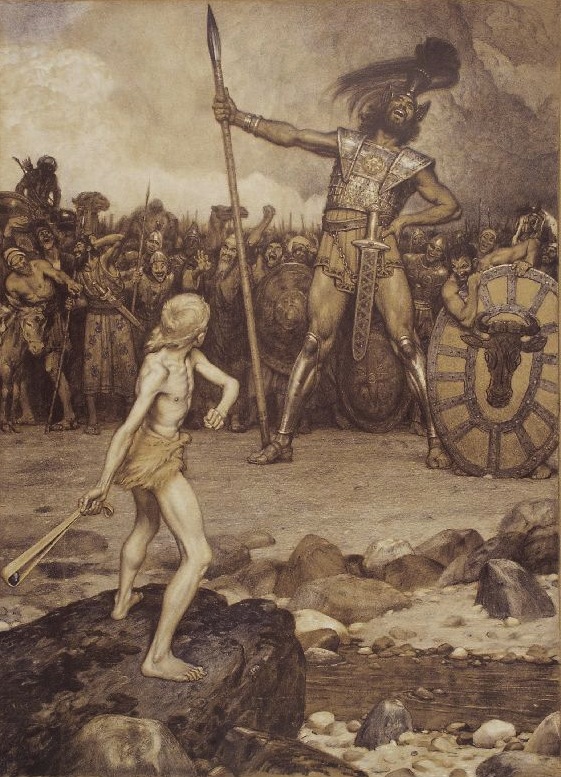
David and Goliath: Underdogs, Misfits, and the Art of Battling Giants by Malcolm Gladwell is about the advantages of disadvantages — and the disadvantages of seeming advantages. As Gladwell puts it:
We have a definition in our heads of what an advantage is — and the definition isn’t right. And what happens as a result? It means that we make mistakes. It means that we misread battles between underdogs and giants. It means that we underestimate how much freedom there can be in what looks like a disadvantage.
When a Disadvantage Can Be an Advantage
David and Goliath presents individual case studies to provide examples where perceived major disadvantages become the key to the underdog to overcome an apparently stronger opponent or situation.
David and Goliath is a book about what happens when ordinary people confront giants. By “giants”, I mean powerful opponents of all kinds….the act of facing overwhelming odds produces greatness and beauty.
Malcolm Gladwell
In the classic biblical recount of David and Goliath’s battle, most people see the confrontation between a young, weak and untrained shepherd against a huge and strong warrior. Surprisingly, however, the young shepherd wins the battle with only a stone and a sling.
Traditionally, this outcome is considered miraculous because no other explanation seems possible. However, Malcolm Gladwell offers a different explanation.
In his book David and Goliath: Underdogs, Misfits, and the Art of Battling Giants, Gladwell presents the idea that sometimes people’s perceived weaknesses can actually be their greatest strength.
Gladwell reviews the fight between David and Goliath and asserts that David actually was in a better position than Goliath in that fight.
First, David had no heavy armor, so that he could move quickly and unhindered. Second, he had great experience using a sling, with which he could throw rocks at extremely high speed and hit targets far away.
Goliath, on the other hand, was at a disadvantage because of the weight of his full suit of armor and sword. Goliath was prepared to fight at close-range but was unprepared for a long-distance fight.
Gladwell adds more details to explain why Goliath was at a disadvantage. According to the author, Goliath suffered from acromegaly, which explains Goliath’s extraordinary size. However, a common side effect of that condition is vision problems, in this case double vision. Gladwell comes to this conclusion because in the story Goliath says: “Am I a dog that you come to me with sticks?” while David only had one stick.
So, the very thing that gave the giant his size (acromegaly) was also the source of his greatest weakness (blurred vision). Gladwell concludes by saying that “the powerful and the strong are not always what they seem”.
In David and Goliath, Gladwell reviews several examples of people with disadvantages such as dyslexia, race, and loss of parents, and explains how many of these individuals actually attribute their success in life to their disadvantages.
When an Advantage Can Be a Disadvantage
To illustrate how an advantage can be in reality a disadvantage, Malcolm Gladwell discusses how attending an elite college or working for a famous company may not always be a favorable situation. To choose an elite college, for example, more often than not, is like choosing to be a little fish in a big pond, because only a few will be able to excel among all the others, all bright students. People increase their chances to stand out by choosing a less known organization or school, where they have a greater chance of standing out, and be big fish in a small pond, instead than small fish in a big pond.
His argument is based on the concept of relative deprivation, coined by the sociologist Samuel Stouffer, during World War II, which describes how we normally measure ourselves against the people immediately around us. In the case of students, for example, they naturally compare their successes or failures not with the entire worldwide population of students, but with those around them, in the same school.
Because of relative deprivation, Gladwell doesn’t believe that elite schools are always the best choice for everybody. He cites the example of a student who was determined to go into science. However, she decided to attend Brown University instead of another less competitive college. While at Brown University, she earned a few mediocre grades and she started to feel inferior to the other straight-A students, even if she was probably still in the 99th percentile worldwide. Because of the effects of “relative deprivation” she ended up quitting science, while if she had attended a less competitive university, she would have probably continued to study science and be successful.
Similarly, the worst STEM students at Harvard may be as smart as the top third students at a lower ranked college. But because Harvard students naturally compare themselves to their Harvard peers, and not to the entire worldwide population of students, they may end up feeling dumb and unsuccessful. For them, it is better to go to an average school, where they can be big fish in a little pond and not small fish in a big pond.
The same principles can be applied to jobs and careers. If you are a programmer, for example, is it better to go to work for a small startup or take a job with Google?
Link to the second part of the blog post about David and Goliath
Link to the Book David and Goliath by Malcolm Gladwell


Trackbacks/Pingbacks